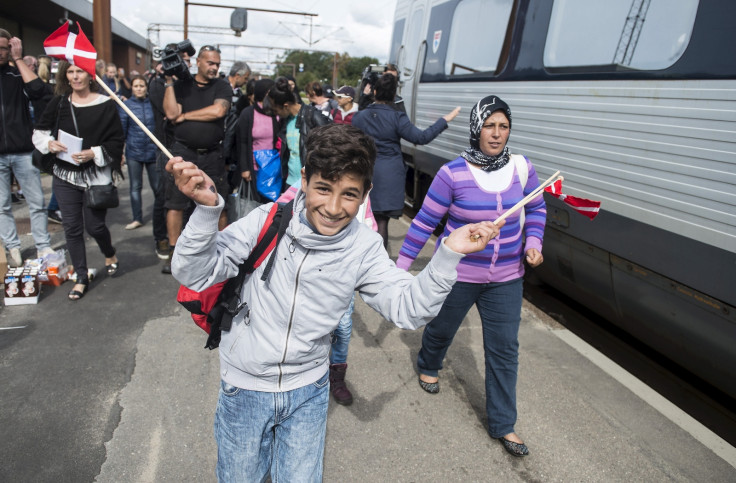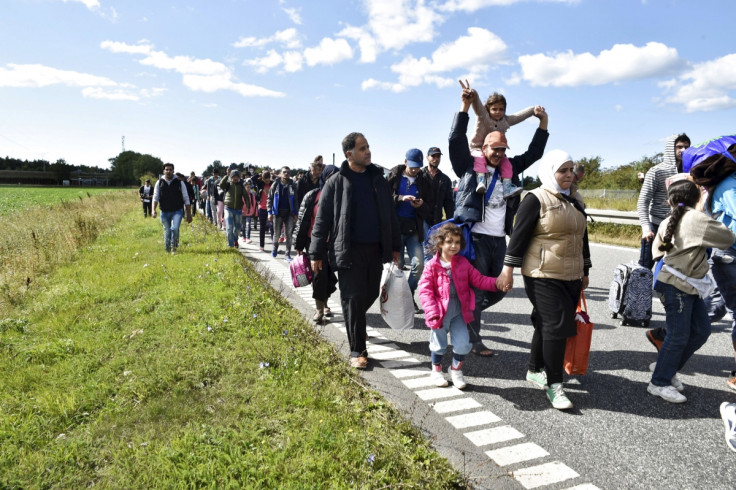Denmark: Asylum seekers learn to be Danish as they wait to hear whether they will be sent home

Qusai Hussein walked across Europe after fleeing Yarmouk refugee camp in Damascus in 2015 and making his way to Denmark. Now the former head teacher, a Palestinian Syrian, is helping a new crop of refugees prepare for life as Danish citizens.
His class today is a mixture of Syrians, Afghanis and Iraqis that have arrived in Denmark within the last six months. Many of the 18-22-year-olds walked into the country from Germany – some with families, some alone. Now they are waiting to see if they will be granted asylum.
Under Danish law, asylum seekers receive financial compensation but are expected to either study or work – usually as an internship known as a "pratik" – as soon as they arrive in the country. Many of the young people learning Danish have missed out on years of formal education as wars in Syria, Afghanistan and Iraq rage.
The school in Roskilde, one of Denmark's oldest towns, is organised by the Danish Red Cross and headed up by Lasse Hansen, 34, a teacher and former diplomat who has lived and worked in the Middle East. He said that while Danish language is the main focus, cultural issues regularly crop up too.
He recalls students asking about everything from the high divorce rate in Denmark to the Danes complex bicycle etiquette, which includes cyclists raising an arm to signify that they plan to stop – a new arrival from Syria, he recalled, wondered why people kept waving at him.
The process, Hansen explains, is dubbed "pre-integration" – educating new arrivals in both languages and trade before they know if they will be granted asylum. If they are, they are more ready to take their place in Danish society – if not, then at least they go home with some skills.
"Of course it is an incentive, the financial perspective, but when I teach I don't feel that our relationship is based on the incentives that they get. I feel that they have a desire to learn, and they want to come," Hansen said.
We didn't come all this way only to be sent back
"I think the overall purpose for a lot of them is not to stop life when they come here [and] wait to see if they get a positive or negative answer. They are impatient. Many come from countries where it is quite normal to work 50 or 60 hours a week. They can be bored. This is why we try to make these activities, so that people can do something meaningful while they are waiting."
All the students at the Red Cross school in Roskilde live in the nearby asylum centre on the outskirts of town. Set amidst rolling green fields and farmhouses, the centre is home to 350 refugees, mostly families, some of whom have recently arrived and others who have been in the country for years. One Nepali asylum seeker living here has been in Denmark 12 years and has still not been approved.
Set-up in 2015, the centre houses families in individual rooms in a sprawling complex that used to be a mental hospital. Children play in the corridors, the smell of food wafts out from shared kitchens and Arabic music blares from behind half-closed doors. Unlike many asylum centres, refugees living in Roskilde are free to come and go as they please, so at 11am the centre is relatively quiet.
Hana, a 20-year-old Palestinian refugee, illustrates how far Roskilde differs from other refugee centres in Europe. When she arrived in Germany with her brother and twin sister she was put in a centre – now closed – mostly populated by single men, who would roam the halls drunk at night. Hana and her siblings would barricade themselves in their rooms at night, fearful and alone. "We felt safe when we came here. There are a lot of families and we can cook our own food," she said.

At the classroom, the majority of the students say they do not expect to go back to their homes. Muneer Hafez, a 22-year-old Syrian from Aleppo, expects the war to continue and looks at Denmark as a new start. He speaks Turkish and Arabic as well as a little English – and, now, a little Danish – and likes the idea of working as a translator if his asylum claim is accepted.
Tarjan Ali Rahman, from Adamiya, also wants to stay regardless of events in Syria. She has been won over by the religious and social freedom she has seen in Denmark: "When a woman works hard and does her best she has rights under the law. There's no discrimination between people according to their language and religion and thinking," she said.
Yasmine, an Iraqi Kurdish refugee who fled Islamic State-held Mosul, is the only person in the room to argue that she would want to go home if the war was over. Yasmine, like most of the Kurds spread across Syria, Iran, Iraq and Turkey, wants to see the Kurdish people granted their own state: "We are six million people and we still don't have our own country," she explains.
As IBTimes UK makes to leave, Hussein begins to translate an emphatic exchange amongst the students in Arabic. He explains that they want to send a message to the Danish people and the government: "They want to say that Denmark has provided them shelter, schools and food - even though they are not European people. They want to thank Denmark for that," he said.
But while the students that have fled war and Isis in Syria and Iraq are likely to be given asylum - indeed, in the case of Syrian refugees, the process is often very quick - it is by no means guaranteed that every refugee in Roskilde will get to stay. At least a third, explains centre manager Kathrine Jensen, have had their applications rejected and face deportation.
Even in these cases, she said, the Red Cross encourages refugees to carry on their work and studies: "Even if people get a negative we try to encourage them to keep going to school and get a pratik because it is something to help them keep going and maybe have some skills to go home with," she said.
As manager, it is often Jensen that has to deliver the bad news: "It is difficult but it is part of the job. You just have to deal with the situation. You get used to it in a way... The good thing here for the Red Cross staff is we can say that we have nothing to do with the decision – we are absolutely neutral," she said.
Hana is one of those. She recently heard that her brother, sister and herself have been denied asylum and will be returned to Algeria, the country from which they began their long journey across Libya, the Mediterranean, Greece, Germany and finally Denmark. Hers is a long story of exile, beginning in 1948 when her family was expelled from Palestine in the war that followed the founding of Israel.
As for what she plans to do next, she is clearly still dealing with the news: "We didn't come all this way only to be sent back."
© Copyright IBTimes 2025. All rights reserved.






















